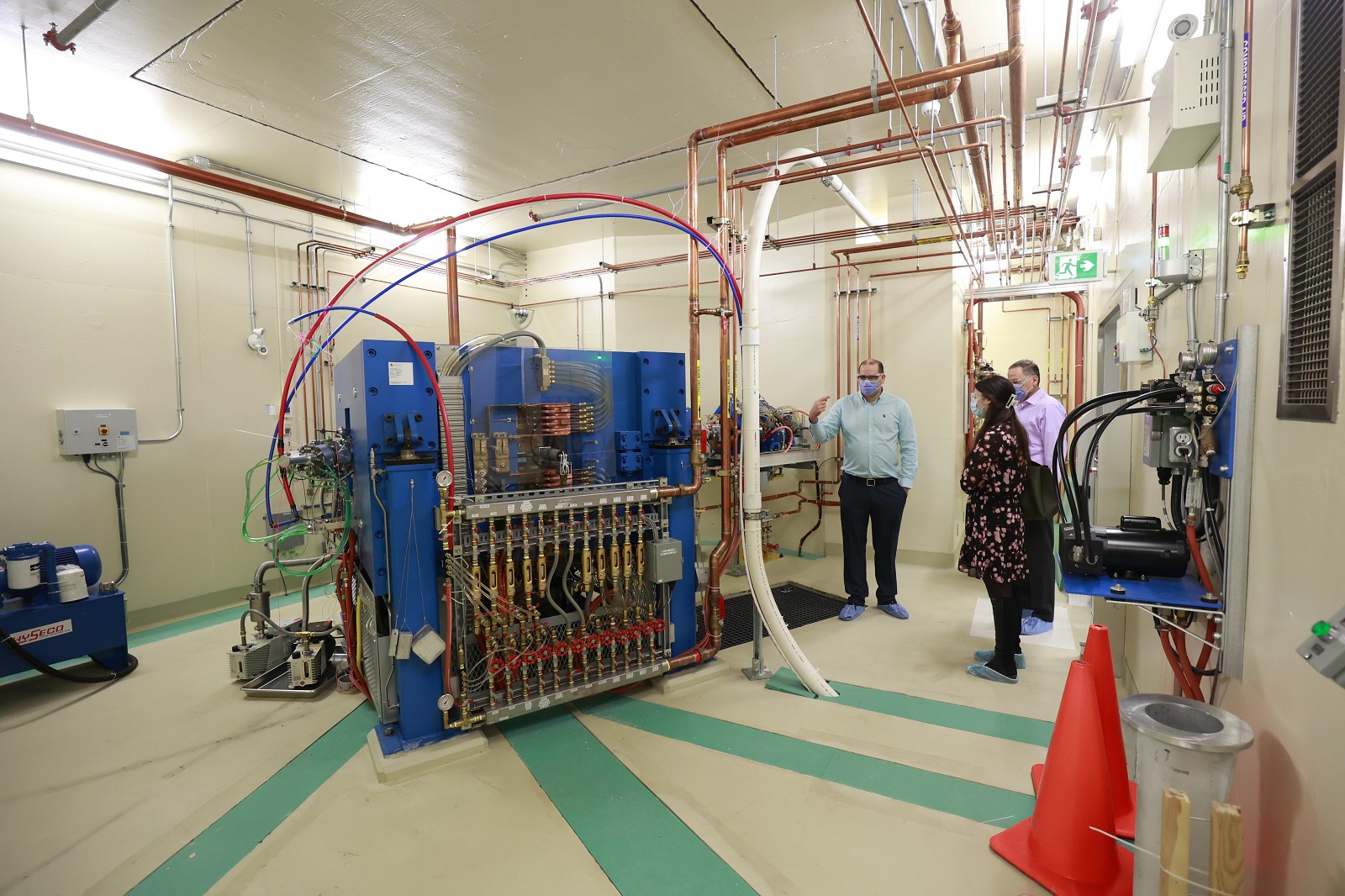Cyclotron providing a reliable supply of isotopes for patient care at TBRHSC
Published Monday, March 28, 2022

Since last year, the cyclotron at Thunder Bay Regional Health Sciences Centre (TBRHSC) has been providing a reliable supply of isotopes used for patient care.
A cyclotron is a machine used to make short-lived radioactive isotopes that can be used for medical imaging to scan clinical oncology patients, as well as for research. These isotopes attach to an injectable sugar substance (radiotracers) and are used to detect the presence and location of cancer cells in the body. A PET (positron emission tomography) scan is used to help diagnose cancer in a way that is effective and safe for the patient.
TBRHSC has been using isotopes for diagnostic imaging since 2008 but prior to producing our own these isotopes were sourced from a vendor in Hamilton, Ontario. Using an out of region vendor often resulted in flight delays or cancellations due to weather or transportation factors, thereby creating a delay in patient care due to scans being canceled.
“During the startup phase of the cyclotron, isotopes were coming from a southern Ontario supplier for a month-long period to ensure everything was running smoothly. During this time, there were two events where the supply from southern Ontario did not arrive,” explains Peter Myllymaa, Executive Vice President, Corporate Services and Operations at TBRHSC and Chief Operating Officer, Thunder Bay Regional Health Research Institute (TBRHRI). “However, with our own supply, the Hospital was able to provide the diagnostic service to the patients who needed them. Prior to producing isotopes locally, these patient procedures would have been cancelled and rescheduled.”
Cyclotron, Isotopes and Patient Impact
Having a local cyclotron provides many benefits to patients in our community and region who receive care at TBRHSC. Producing isotopes in Thunder Bay for patient use means:
- Improved availability of isotopes for use in imaging at our Hospital (e.g., cancer diagnosis) to enable faster treatment planning.
- Critical infrastructure to enable our researchers to work on new discoveries, and uses for the isotope radiotracers.
- Expand and grow our imaging uses to improve prevention, early diagnosis and management of cancers.
- Allow our researchers to connect and collaborate with other researchers and networks to further enable scientific discoveries in diagnostic imaging with implications for patient care.
“One of the biggest benefits that we are seeing in producing our own isotopes is the number of patients we can treat,” said Sandra Willson, Manager of Diagnostic Imaging at TBRHSC. “When we were outsourcing isotopes, we could see a maximum of five patients per day, and that is if they arrived here without any delays. That number has grown to nine – almost double. This means less cancellations, less rescheduled appointments, and a faster diagnostic time, which means treatment planning can begin sooner. This is especially important, not only for patients in Thunder Bay, but those travelling from across Northwestern Ontario for their appointments.”
Apart from patient care, isotopes from the cyclotron can also be used for research.
“In addition to the F-18 isotopes that we are producing for patient use, there are isotopes we produce that are being used for research projects for TBRHRI and Lakehead University,” said Agha Hasan, Director of Cyclotron Operations at TBRHSC. One interesting project underway is being led by Dr. Jinqiang Hou, Research Chair at TBRHRI and Lakehead University, related to radiochemistry including radio-tracer and drug discovery for targeted cancer diagnostics using PET.
“The cyclotron brings a unique opportunity to our Hospital and Health Research Institute”, said Dr. Rhonda Crocker Ellacott, President and CEO of TBRHSC and CEO of TBRHRI. “It gives us the ability to be more responsive to the needs of our oncology program and support health research that puts the patient first. No longer will a patient arrive in Thunder Bay having travelled from a remote community in the region to learn that the plane carrying the isotopes did not make the trip and they should go home and re-schedule the appointment. They will be treated with locally produced isotopes that will guarantee the care when and where they need it. Bringing this technology to Thunder Bay would not have been possible without the support of our partners in government, and the generosity of donors who continue to make exceptional cancer care possible here at our Hospital."